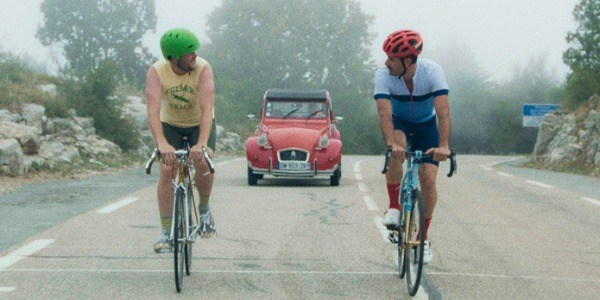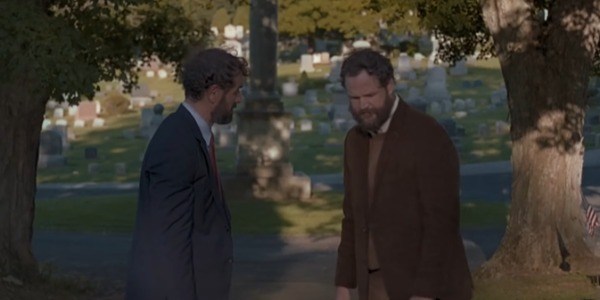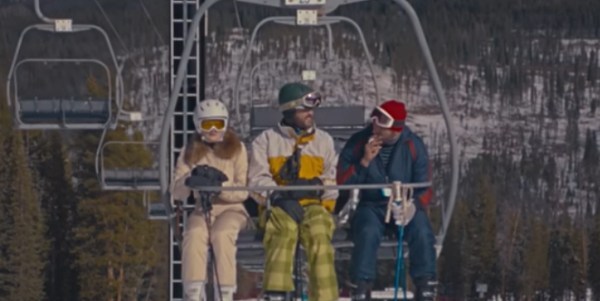THE CLIMB: Smart & Relentlessly Awkward Comedic Debut
The Climb is a marriage comedy about two men who don’t fully realize that they’re married to each other. Sure, it’s a buddy film in the vein of something like Once Upon a Time in Hollywood, and I certainly wouldn’t argue that the provisional marriage between these characters is necessarily romantic or sexual. But, The Climb is expressly about two guys who really want to be together; in fact, it’s possible that, through tragedy and heartbreak, they’re cosmically linked to each other, til death do them part. More specifically, the film is arguably a contemporary, male-oriented revision of Stanley Cavell’s concept of the “comedy of remarriage,” in which two characters keep putting obstacles between each other until they face the truth of their friendly relationship.
This unique masculine bond is in play from the film’s opening scene, which finds Mike (Michael Angelo Covino) and Kyle (Kyle Marvin) on a placid and serene bike ride in France. Without much warning, an earth-shattering confession is made: Mike first slept with Kyle’s fiancée (Judith Godrèche) long ago, and is, in fact, still sleeping with her. It’s a stark betrayal, but rather than evenly directing his anger at all parties involved, the target of Kyle’s disappointment isn’t his longtime girlfriend—his fury is exclusively aimed at his buddy. By the time it’s all said and done, does Kyle feel like Mike cheated on him? Captured in one take, the opening scene economically lays the groundwork for everything that follows, establishing this dynamic partnership without missing a beat.
Directed by Michael Angelo Covino and co-written by leading actors Covino and Kyle Marvin, The Climb is an intelligent and uncomfortable comedy, alive with palpable cinematic energy and written with an awkward prickliness that’s almost impossible to pin down. Put more succinctly, it’s one of the better comedic debuts I’ve seen in a long time.
Best Friends Through Tough Times
After the opening scene, Mike and Ava do indeed get together, leaving poor Kyle in the dust. In the aftermath of Mike and Ava’s passionate kiss that re-calibrates the central relationship, the film jumps to several years later, a time when tragedy strikes without warning. Ava dies, leaving Mike devastated—after his sudden breakdown at the funeral, he’s reunited with Kyle for the first time in years. Following the death of the love of his life, Mike is a mess, gaining weight and drinking his sorrows away on the daily. Meanwhile, Kyle’s life is thriving—he’s about to marry Marissa (Gayle Rankin), his former high school sweetheart, who is slightly despised by both his mother (Talia Balsam) and the estranged Mike.

Mike and Kyle begin to re-enter each other’s lives at a family Christmas party; Kyle’s mom invited Mike without much of a warning to her own son (the film makes it seem as if Mike was, in some ways, the family’s foster son). Wasted beyond belief, Mike ends up passing out drunk on a table, but that doesn’t stop him from re-connecting with Kyle and Marissa on a later ski trip.
Unfortunately, Kyle’s life is thrown into disarray by his friend’s chaotic energy—a presence that threatens to destroy his newfound happiness and ruin another one of his happy relationships. Once again, it’s worth asking—by marrying Marissa, is Kyle actually breaking up with Mike?
Uncommonly Inventive Directorial Debut
In a cinematic climate where most comedies seem to be utterly generic and indistinct, devoid of many notable directorial voices to shake things up, Michael Angelo Covino is a breath of fresh air. While I can certainly see someone making the argument that different aspects of The Climb‘s singular style are gimmicky, I think the filmmaking on display is actually much smarter—and far more daring—than that. In situations where other filmmakers would be content to let the script do the heavy lifting, Covino employs his strengths as a director in an idiosyncratic way, calling attention to the camera’s movements while also letting scenes flow and unfold at their natural pace.

Covino‘s weapon of choice is the long take, and it’s the perfect tool for a film that thrives on awkward encounters repeatedly stretched out to a painfully extreme duration. Save for any invisible cuts, the opening scene (which I believe was the original basis for Covino‘s 2018 short) is all shot in one take, and it’s an ingenious way to capture such a brutal encounter—capped off by a sudden burst of violence that sees the camera slowly drift away.
Yet, thankfully, the use of the long take in the film’s brilliant inciting incident isn’t merely technical showmanship. This formal nuance becomes part and parcel of Covino‘s cinematic grammar, a way of creating an effortless sense of flow within individual sequences that simultaneously contributes to the film’s comedic energy. The subsequent setpieces—which both take place at Kyle’s family home during major holidays—continue to place an intense emphasis on the camera’s observant power, moving through these labyrinthine interior suburban spaces while escalating the central conflicts along the way. These sweeping camera movements make the film cringe-worthy and a little claustrophobic to behold, but it’s also kind of magical—a stunning way to bring fluid life to what could have otherwise been mundane.
Clever & Incisive Script Elevates Indie Comedy
It’s also impossible to overstate how crucial sound is in these moments. The film clearly takes some cues from Robert Altman‘s beloved overlapping dialogue, and the low-key muttering of disgruntled family members (half of the talk is about old high school football games) only adds to the tense ambiance of every moment. Beyond Altman, the late 1960s and early 70s films seem to be the primary inspiration for Covino more generally, ranging from the standoffish vibe of the comedy to more explicit allusions. The Graduate gets a direct shout-out in a frantic wedding scene—Mike’s drastic attempt to stop Kyle from marrying Marissa (he doesn’t think she deserves him) is a brilliant reinvention of the classic scene from Mike Nichols‘ film.

With Covino‘s strong directorial instincts and predilection for 70s-inspired flourishes guiding the film, The Climb‘s inventive style provides ample room for its script and stars to shine. And this really is essentially a two-man show: as both co-writers and the main stars, Covino and Marvin are in total control from start to finish. As Mike, the loving friend who also seems to overestimate his supposed knowledge of what’s good and bad for Kyle, Covino is terrific. Mike seems to possess a far-reaching, blunt disdain for a whole bevy of people and situations, but he can also turn on the charm when necessary, suppressing his matter-of-fact, sociopathic delivery of critical information. But even if Mike is the flashier presence, Kyle is the primary subject of our sympathies. In this regard, Marvin is a genuine discovery. His generosity as a performer—and the sense of wholesome goodness that he brings to the character—reminded me of John C. Reilly at his best.
The final piece of the puzzle is the script, and Covino and Marvin prove to be formidable and talented scribes: they effortlessly understand these characters and their unspoken marriage to one another. The film is not only impeccably structured—it also achieves an impressive level of humor and intelligence without ever sinking to cliches. Covino and Marvin play with repetition and the cyclical nature of this entire story—some of the most unbearably awkward scenes are awkward precisely because it’s very clear where it’s all headed. The film has shown us this situation before, and we just know it’s not going to end well. Yet crucially, The Climb is also really funny—a character study that isn’t without its fair share of gags.
The Climb: Conclusion
By the time Mike and Kyle are back on their bikes at the film’s end, having weathered failed relationships and personal backstabbing, the narrative has come full circle. Despite all the fierce conflict in the years that followed their initial rupture, nothing between them has really changed. Only there is a slight change: Mike and Kyle seem committed to their own mutual solitude, destined to go on together without romantic challenges getting in the way. Their friendship is the last refuge from their own failings—as such, it’s the marriage they needed after all. Whether this is hopeful or depressing is up to you to decide—the film doesn’t make much of a judgment either way.
Regardless of that potential ambiguity, The Climb is an exciting and robust debut from Michael Angelo Covino. While this was likely something of a passion project for the co-writer/director and Kyle Marvin, I can’t imagine anyone walking out of this film and not being excited for whatever the rest of Covino‘s promising career has in store.
What did you think of The Climb? Are you excited to see more work from director Michael Angelo Covino? Let us know in the comments below!
The Climb will be released in the US on November 13th, 2020. For a full list of international release dates, click here.
Watch The Climb
Does content like this matter to you?
Become a Member and support film journalism. Unlock access to all of Film Inquiry`s great articles. Join a community of like-minded readers who are passionate about cinema – get access to our private members Network, give back to independent filmmakers, and more.
Join now!





